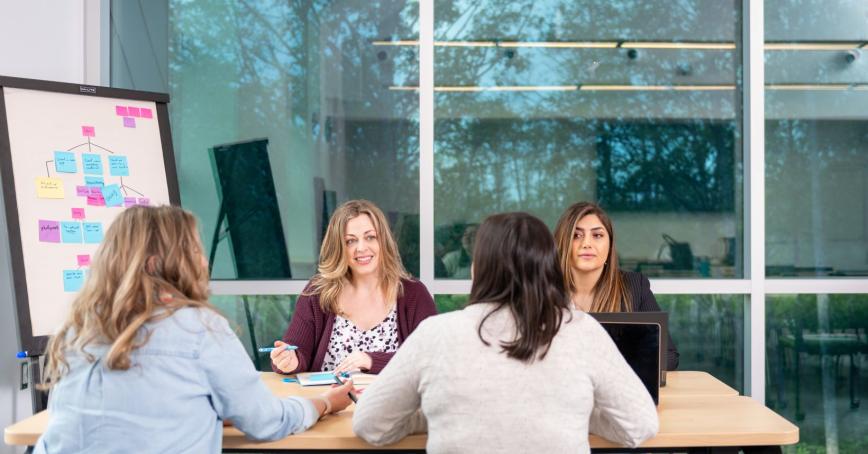Live Case Challenge puts theory into practice
Topics
Featured
Share online

Learn more about the Master of Arts in Professional Communication.
Good communications work is a state of mind where the process is as important as the product itself.
That’s at the heart of the Master of Arts in Professional Communication live case challenge, and the value of the experience is one that one recent graduate, Susan Teppin, knows well.
“Communications is more than a plan or a department. We dissected communications almost like a forensic investigator. It was a company audit on communications, culture, values and organization,” she says. “The case challenge really brought those communication theories we were learning into practice. It was the learning grounds that started you on that research bend to know where to look, what to question and to really have that open mind.”
Studies prepare students to tackle real-world problems
During pre-residency, students are introduced to theory and research methods, laying the groundwork for applying new and old insights into a real-world live case challenge with a client organization during their two-week in-person residency, says Jennifer Walinga, professor in the School of Communication and Culture. At the end, the client is presented with the research and given an implementation strategy to address the challenge.
“People learn all the concepts and principles that guide how people interact with each other, community, the environment, and other organizations – but how to do that better,” Walinga says. “The whole program is about understanding how we learn and change and what’s involved. It’s about becoming uncomfortable and choosing to lean into it to take on and confront your assumptions and biases.”
Working with clients puts theory into practice
Equipped with new theories and ideas, the case challenge showed Teppin the value of thinking like a contractor, both for the case challenge client and in her daily work as director of change management with BC Energy Regulator.
“You get caught up in what you know, and as humans, we make assumptions and can come to conclusions too easily,” Teppin says, noting the experience reinforced the importance of asking why and looking deeper into a problem before trying to solve it.
Real world, real work, real solutions
Just what problems students have been asked to solve in the case challenges are as diverse as the organizations presenting them. Topics include government relations, community building, branding and marketing, and tackling social problems, among others.
Every time she watches it unfold, Jennifer Walinga is delighted by the calibre of the students’ work.
“They fold in other tools they are learning about from research and theory, and their products are amazing. They are always so impressive. I love watching the clients’ face as we watch the shared brilliance of the learners,” says Walinga.
It’s an appreciation echoed by past case challenge client Madison Sutcliffe, member engagement manager with the Downtown Victoria Business Association.
“Receiving thoughtful, graduate-level insight through this program was an opportunity to access creative, strategic thinking that could inform real action,” she says. “There was an exciting balance of theory and creativity in their presentations, and the solutions they proposed were grounded in purpose and clarity. We were so inspired by one of the brand concepts that we’ve since worked with a designer to further develop it.”
Student solutions put into practice
The ideas shared by the spring 2025 cohort aren’t gathering dust either.
“The flexible strategies presented by the students gave us a roadmap that we can scale according to the resources available to us,” Sutcliffe says. “Most importantly, it underscored that there’s no single quick fix or “magic wand” for changing perceptions. Meaningful communication strategies take time, consistency, and collaboration. The students’ work reminded us that progress is built through many small, intentional steps – and that telling our downtown’s story in an authentic, inclusive way is one of the most impactful things we can do.”
The learning continues this fall with Walinga’s current Master of Arts in Professional Communication student cohort and new organization clients participating in a live case challenge on November 21.
Learn more about the Master of Arts in Professional Communication.